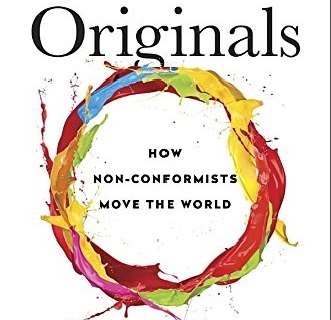A new book by Wharton management professor Adam Grant is challenging what we think we know about what it takes to be a world-beating entrepreneur.
Grant’s new book, Originals: How Non-Conformists Move the World, attempts to deconstruct what people need to “champion new ideas and fight groupthink”.
In doing so, Grant challenged his own assumptions about what it takes to become an “original”, particularly the idea that they are first movers and risk takers. It turns out they are typically neither.
“I expected if you wanted to be an original - the kind of non-conformist who champions new ideas and really drives creativity and change in the world - you had to be an early bird, a first mover,” Grant said in an interview promoting his book.
“But the evidence proved me wrong. It turns out that most originals are great procrastinators. They’re constantly putting things off.”
Through his research and study of the world’s most original – and successful – thinkers and entrepreneurs, Grant surmised that many engaged in what he called “strategic procrastination” as they waited for “the right time” for their idea to take hold.
“I’ve actually been a victim of the opposite of it for a while. I’m actually a pre-crastinator. I’m someone who if I know I have something due in six months, I will feel urgent pressure to do it now and worry about it constantly until the moment it’s done,” Grant said.
“What I noticed as I compared that against the originals I studied … was if they put off the start or completion of the task a little bit, they allowed themselves to access more diverse ideas, and they saw possibilities that I wouldn’t have seen.”
By leaping in early, Grant believed he was in danger of succumbing to his most conventional ideas.
“You have to sort of weed out the familiar in order to get to the much more unusual and original, and I wasn’t doing that when I dived right into a task,” he said.
“I’ve come to believe that we should all procrastinate deliberately.
“But if you push that too far of course you’re not going to have time to finish your work.”
As he wrote his new book, Grant took onboard the idea of strategic procrastination.
“As a writer, for example, I have learned to leave drafts unfinished on purpose,” he said.
“What I’ll do is I’ll start working on a draft, and I really want to spend the next two hours finishing it, but I will put it away.
“Then three days later when I come back [to it] I have seven or eight new ideas that I would never have considered because now it’s in the back of my mind.
“We have a much better memory for incomplete rather than complete tasks. So the moment I hit send on that draft it’s out of my mind, whereas when I leave it open then I’m constantly processing it, I’m seeing new possibilities.”
To that end, Grant learned to sit on “finished” drafts for two or three weeks before finally shipping them to his publisher.
“By the time I come back to it I have enough distance to … approach it with a fresh perspective,” he said. “For me that’s what strategic procrastination is all about.”









